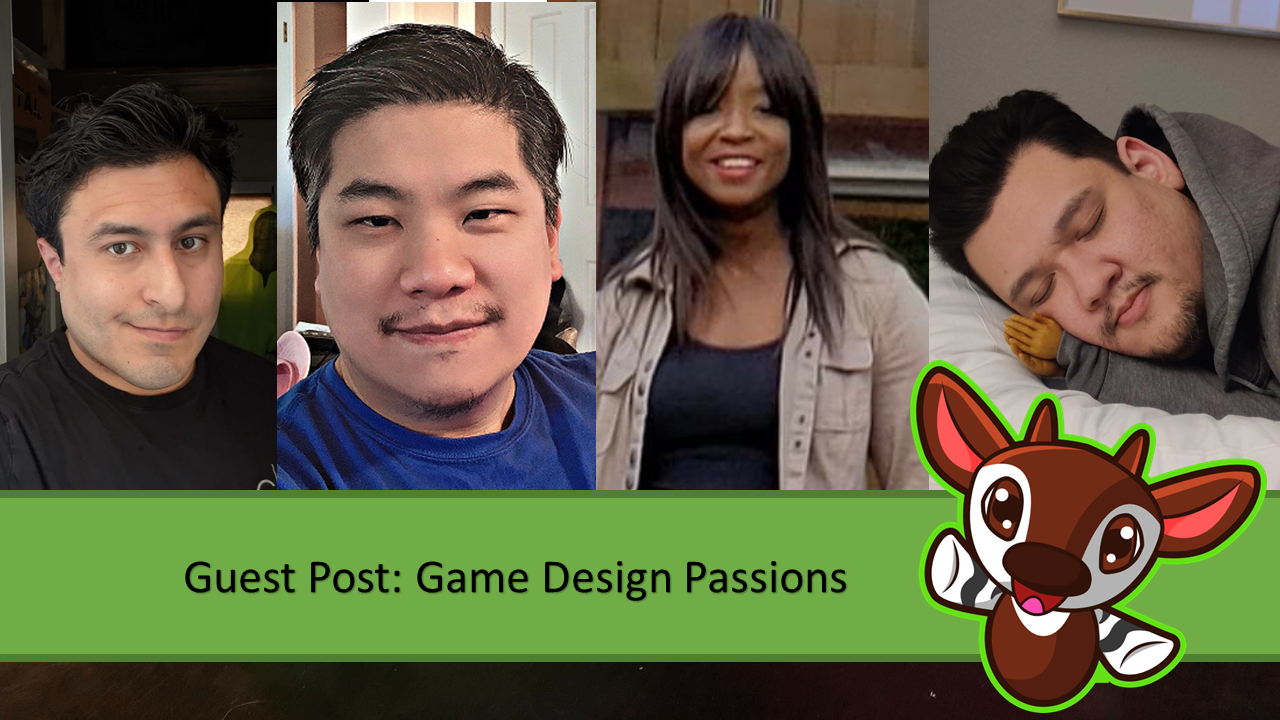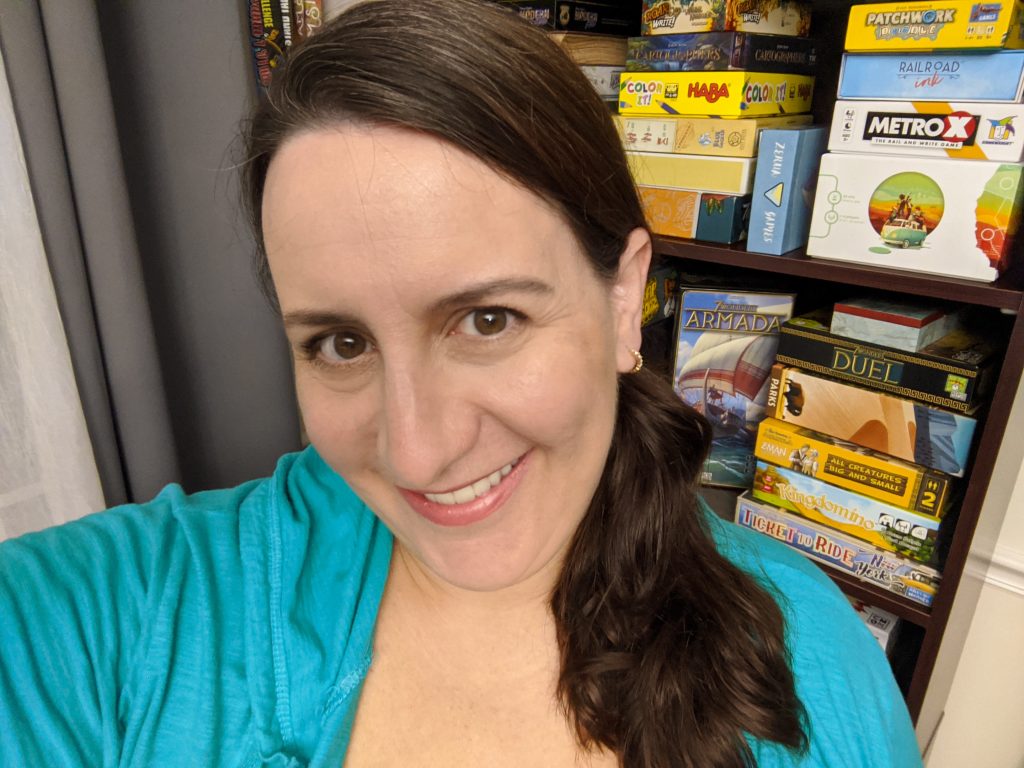
I know a lot of amazing designers and I wanted to highlight some of them, which is why I’m starting some guest posts! Each post will be a question about design or publishing and will hopefully give you a variety of perspectives to learn from.
What are you passionate about in game design? How did this become your “thing”? (This could be a certain mechanism, accessibility, a theme, anything really!)

“I am especially passionate about the narrative and thematic angles of game design! The ability to tell stories and create an experience for players through the use of components, mechanics, and player interactions is absolutely amazing. I love the feeling of being drawn into a setting and experiencing a variety of emotions as I play games with others or by myself in solo mode.
I think it stems from being an avid reader, a lover of travel, and that innate human desire of wanting to connect with others. I am definitely still developing and fine tuning this skillset, but I am working towards being able to transport players to realms of new, old, and somewhere in-between with my designs.” – Raven McKenzie, @_RavenMcKenzie

“More than anything I love building something and seeing it come to life. That being said, the original “thing” that got me into game design is wanting to see what a game about losing would be like. I wanted a game where losing didn’t just feel like winning with a lower score, and where the goal as the player was to lose. This ended up showing up in my first design, Heckin Hounds.” – Mattie Schraeder, @AFrozenPeach

“I’m passionate about the overall creative process. Having a finished product out in the world that originally spawned from my brain creates such an incredible sense of satisfaction and pride for me.” – David J. Bruglia, @DavidBruglia

“Choices that are interesting and fun. My biggest pet peeve in games is feeling pigeon-holed into making decisions.” – Nicholas Yu, @yutingxiang

“Really what made this hobby a long term passion of mine is its connection with community and people. Board games inherently connect you with the players at your table, and in order to playtest your game, you really have to get out there and meet new people.” – Joseph Z Chen, @fanfactories

“I really love games that have animal or plant related themes. An overwhelming majority of the games I want to design are nature themed, and I get especially excited about games that engage with realistic environmental systems and integrate them into the game mechanics. If I could find a good game with crop rotation or companion planting in it, I’d lose my mind.” – Sara Perry, @saraperry96

“For game design, I’m most passionate about my thoughts becoming tangible creations that other people can enjoy. When people socialize, it’s a momentary thing where people communicate how and what they feel. As an introvert, that’s hard for me, but with games, I can create this physical game that communicates how I think and feel.
And if I’m lucky, lots of other people will experience it and put their own thoughts and feelings into it, and at the end of the game’s design, it will be a manifest of my socialization with all the different people I encountered, which I think is amazing.” – Fertessa Allyse, @fertessa

“I love this question. My first game design came about in an attempt to replicate the feeling I got from a movie. So it has always been about experiences for me, and creating fond memories for players to share.” – Jadyne (Jay) Bell, @thejaybell

“Game design heuristics are something I have been fascinated about since reading various theories about board game design in college. I like the idea of taking observations from a bunch of games across different genres and generalizing universal principles of game design from them. I am always looking for useful heuristics that let a designer take a problem with their game, recognize a pattern, and apply a known solution.
Take Foreshadowing, for example. Many solo and coop games have random events or an AI that opposes the players. But it can feel arbitrary and unfair when the game acts unpredictably and the player suffers losses without any way to prepare for it. A good heuristic illustrated by games like Spirit Island and Slay the Spire is to foreshadow the adversary’s actions in proportion to their (negative) impact on the player. Players get a small amount of time to prepare for low-impact actions and a larger amount of time for high-impact actions. I think Spirit Island does this especially well because each invader card is a randomized action that escalates in severity over three turns, so the response time given to the player for each stage naturally scales as well.” – Ananda Guneratne, @AnandaGuneratne

“Games are a form of collective story telling – whether its a rollicking pirate adventure or just the journey through a land made of candy. They’re also a fantastic way to learn something new. I wanted to combine my love of the two.” – AnnaMaria Jackson-Phelps, @annamaria_jp

“It truly has always been about bringing people together for me. I loved having my friends over to sit around a TV and play video games together. Then we would talk about the games and bond over it. I have friends I have gamed with when I was 8 to this day.” – Chris Solis, @CGCFOX

“I enjoy teaching and helping others through community work. I always enjoyed working and helping others. Design wise, I enjoy working on high player-interaction games that bring players together.” – Tony Tran, @tonymakesgames

“I’ve loved story-driven games ever since video games like Final Fantasy IV and Chrono Trigger. When I learned that DM-less tabletop games with big stories existed (like Gloomhaven or even Above and Below), I was hooked. I also love games that encourage player interaction, whether it’s sneakily stealing something your opponent needs or building a story together.
But when I learned that small solo/co-op games existed on itch.io that encourage worldbuilding via journaling and prompts, it blew my mind and opened a whole new world to me, one that’s captivated me like no other. That’s what I want: to gamify journaling/prompt-based worldbuilding experiences.” – Charlie Jackson, @CataclysmGames

“It was accidental actually. I was a science educator and I saw that using games to teach was very effective for my students. So I started creating STEM and educational games targeting specific learning objectives.” – Chidi Page, @chidipaige
Did you enjoy this entry? Which designers would you want to hear from next? Please let me know! I’d love to hear what you think and what kind of things you’d like to see from this blog. Feel free to send me an email or comment with your thoughts!
Don’t forget to sign up for my mailing list, so you don’t miss a post: https://tinyletter.com/carlakopp